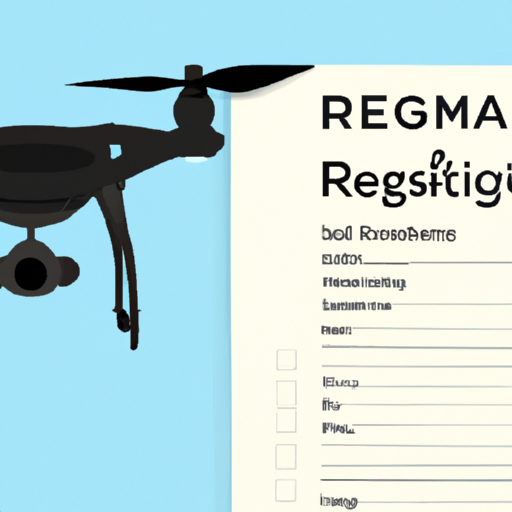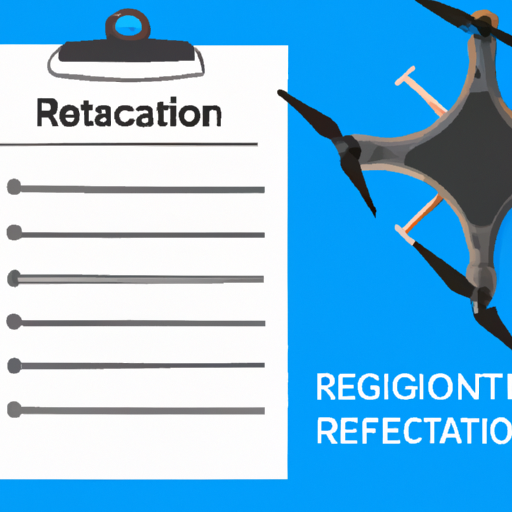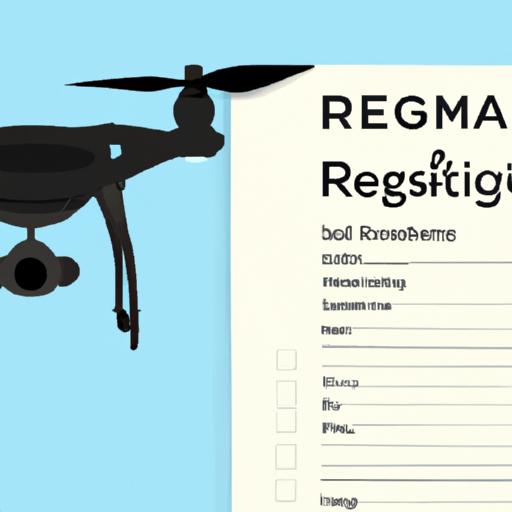If you’ve ever wondered whether you need to register your drone with the FAA, you’re not alone. With the increasing popularity of drones, this question has become a hot topic among drone enthusiasts and hobbyists. In this article, we will explore the regulations surrounding drone registration with the FAA, clarifying what is required and what the implications are for drone owners. So, let’s get started and find out if your drone needs to be registered with the FAA!

Overview of FAA regulations on drones
Background on FAA and its authority
The Federal Aviation Administration (FAA) is the national aviation authority in the United States that has the responsibility of regulating and overseeing civil aviation within the country. It is an agency under the Department of Transportation and is responsible for ensuring the safety and efficiency of the national airspace. The FAA has the authority to set rules and regulations for all aircraft, including drones.
History of drone regulations
As drones became more accessible and popular among both recreational and commercial users, the FAA recognized the need to establish regulations to ensure the safe and responsible operation of these unmanned aircraft. The agency began developing regulations specifically for drones in 2015, with the introduction of the Small UAS Rule (Part 107). Since then, the FAA has been continuously refining and updating the regulations to keep up with the rapid advancements in drone technology and the growing number of drone operators.
Importance of drone registration
Drone registration plays a crucial role in ensuring accountability and safety in the national airspace. It allows the FAA to keep track of the drone population, monitor their usage, and safeguard the airspace from potential hazards. By requiring registration, the FAA can identify and communicate with drone operators, provide safety information, and enforce regulations when necessary. Additionally, drone registration helps in investigations and addressing any incidents or accidents involving drones.
Current requirements for drone registration
Definition of a drone
According to the FAA, a drone, or Unmanned Aircraft System (UAS), refers to any aircraft operated without a pilot on board. This includes various types of unmanned aircraft, such as quadcopters, fixed-wing drones, and even some remote-controlled model aircraft.
Different types of drones
Drones come in a wide range of sizes, shapes, and features, catering to different purposes and applications. They can be categorized into recreational drones, commercial drones, and government or public safety drones. Recreational drones are typically used for personal enjoyment and hobby purposes, while commercial drones are employed for professional activities like aerial photography, package delivery, or inspection services. Government or public safety drones are used by law enforcement agencies, fire departments, or other authorities for surveillance, search and rescue operations, or disaster response.
Which drones must be registered
The FAA requires drone operators to register their drones if the aircraft weighs more than 0.55 pounds (250 grams) and less than 55 pounds (25 kilograms). This weight range covers the majority of drones available on the market, including both recreational and commercial drones. It is important to note that the registration requirement applies to both U.S. citizens and non-U.S. citizens who operate their drones within the United States.
Exceptions to registration requirements
Certain categories of drones are exempt from the registration requirements imposed by the FAA. These include drones operated by the U.S. government, such as military drones or those used for law enforcement purposes. Drones flown exclusively indoors or those used for educational or research purposes, as well as certain model aircraft flown under specific criteria, are also exempt from registration. However, it is crucial to review the FAA’s guidelines and regulations to determine whether a specific drone falls within these exemptions.
Benefits of drone registration
Enhanced safety measures
One of the key benefits of drone registration is the promotion of safety in the airspace. By having a registered drone, operators can stay updated on any safety notices or information provided by the FAA. This helps drone operators stay informed about temporary flight restrictions, nearby airports, or any other potential hazards. Additionally, if a registered drone gets lost, stolen, or involved in an incident, the registration information can assist authorities in identifying the owner and resolving the situation promptly.
Promotion of responsible drone use
Drone registration encourages responsible drone operation by making drone owners aware of their obligations and responsibilities. Registering a drone involves providing contact information and acknowledging the FAA’s safety guidelines. This acts as a reminder for operators to understand and adhere to the rules and regulations governing drone operation. In turn, responsible behavior contributes to the overall safety and public acceptance of drones.
Identification and monitoring of drone operators
Drone registration enables the FAA to track and monitor the growing number of drone operators across the country. By having a database of registered drones, the FAA can effectively identify and communicate with operators if needed. This facilitates education and outreach efforts, allowing the FAA to provide important information and updates on regulations, airspace restrictions, or any changes that may impact drone operators. It also helps in enforcing regulations and taking necessary actions in case of any violations.
Process of drone registration
Requirements and eligibility criteria
The drone registration process with the FAA is relatively straightforward. As a drone operator, you need to be at least 13 years old to register your drone. You will need to provide your name, physical address, and email address to create an account on the FAA’s dedicated drone registration website. Additionally, you need to pay a minimal registration fee and agree to the safety guidelines and regulations set by the FAA.
Registration fees and renewal process
At present, the registration fee for a drone is $5, payable online during the registration process. However, it is important to note that the FAA’s registration fee structure is subject to change, so it is vital to check the latest information provided by the agency. The registration is valid for a period of three years, after which it must be renewed. Drone operators must remember to renew their registration to ensure compliance and maintain an up-to-date record in the FAA’s database.
Obtaining a drone registration number
Once the registration process is complete, the drone operator will receive a unique registration number directly from the FAA. This registration number should be marked on the drone, either by using stickers or other means, ensuring it is easily visible and legible. The registration number serves as a proof of identification and indicates compliance with the FAA’s registration requirements. It is crucial to have the registration number properly displayed whenever operating the drone.
Displaying the registration number
The FAA mandates that the registration number obtained during the registration process must be displayed on the drone. This enables easy identification of the drone’s owner and facilitates any necessary communication with the operator. The registration number should be visible on the drone’s exterior and should not be covered or obscured by any other accessories or attachments. Adhering to this requirement ensures that drone operators comply with the FAA’s regulations and facilitates prompt resolution of any issues or incidents involving the drone.

Consequences of failing to register a drone
Legal implications and penalties
Failure to register a drone with the FAA can have severe legal consequences. Under the FAA Modernization and Reform Act of 2012, any drone operator not complying with the registration requirements can face civil and criminal penalties. Civil penalties can amount to up to $27,500, while criminal penalties can reach up to $250,000 in fines and three years of imprisonment. It is essential to recognize the seriousness of non-compliance and the potential impact it can have on both personal and professional levels.
Enforcement actions by the FAA
The FAA takes the enforcement of drone registration regulations seriously. The agency actively monitors and investigates reported instances of non-registered drones, as well as incidents involving registered drones that violate the rules and regulations. If a drone operator is found to be operating without registration or in contravention of FAA regulations, the FAA may take enforcement actions, including issuing fines, revoking flying privileges, or pursuing legal action. Compliance with the registration requirements is crucial in avoiding such enforcement actions.
Case studies and examples
There have been several instances where the FAA has taken enforcement actions against drone operators for failure to register their drones. In 2015, the FAA reached a settlement agreement with a drone operator who had flown a drone over New York City without being properly registered. The operator agreed to pay a $1,100 fine and comply with future FAA regulations. These cases serve as reminders of the importance of adhering to the registration requirements and the potential consequences of non-compliance.
Controversies and challenges surrounding drone registration
Privacy concerns and data collection
One of the major controversies surrounding drone registration is related to privacy concerns and the collection of personal information. Some individuals argue that the FAA’s requirement to provide personal information during the registration process poses potential risks, such as identity theft or unauthorized access to personal data. However, it is essential to note that the FAA is committed to safeguarding the privacy and security of the information collected, using it solely for regulatory and safety purposes.
Impracticality for recreational users
Critics of drone registration point out that the process may be burdensome for recreational drone users, who often fly their drones in a casual and informal manner. They argue that the registration requirement may discourage individuals from engaging in recreational drone activities and hinder the growth of the drone hobbyist community. However, with the increasing number of incidents involving drones, proponents of registration maintain that the process is necessary for safety and accountability, outweighing any inconvenience caused.
Difficulty in enforcement and compliance
Enforcing and ensuring compliance with drone registration regulations can be challenging due to the sheer number of drones in operation. With the market flooded with a wide range of drones, including low-cost options, it becomes difficult for authorities to track and identify drones that are not registered. This creates an enforcement challenge and highlights the need for effective monitoring, education, and ongoing efforts to promote compliance among drone operators.
Comparison with international drone registration laws
Overview of regulations in other countries
Several countries have implemented their own drone registration laws and regulations to address the growing use of drones. The specifics of these regulations vary from country to country, with some requiring mandatory registration for all drones, while others have thresholds based on weight or purpose. Examples of countries with drone registration laws include Canada, Australia, Germany, and the United Kingdom, among others.
Different approaches and requirements
While the basic objective of drone registration is consistent across countries—to ensure safety and accountability—each country adopts its own approach and sets specific requirements. Some countries mandate registration for all drones, regardless of their size or purpose, while others prioritize registration for drones above a certain weight threshold. Additionally, the registration processes and associated fees can vary significantly, depending on the country’s regulatory framework.
Lessons and best practices
Comparing and assessing international drone registration laws can offer valuable insights into different approaches, challenges, and best practices. It allows for the exchange of knowledge, facilitating improvements in existing regulations and providing guidance for countries seeking to implement or refine their own drone registration systems. Collaboration and dialogue between regulatory bodies globally can contribute to the establishment of consistent and effective international standards.
Efforts to update and modify drone registration rules
FAA’s proposed rule changes
Recognizing the need to adapt to changing drone technology and address the evolving needs of drone operators, the FAA periodically proposes updates and modifications to the existing drone registration rules. These proposed changes often aim to streamline the registration process, ensure compliance with new regulations, or address specific concerns raised by stakeholders. Stakeholders have the opportunity to review and provide feedback on proposed rule changes during the public comment period.
Public comments and feedback
The input and feedback from the public play a significant role in shaping the future of drone registration rules. The FAA actively seeks input from drone operators, industry experts, organizations, and other interested parties to ensure that any proposed changes take into account diverse perspectives and address potential challenges. This engagement process allows for a more comprehensive and effective regulatory framework that meets the needs of all stakeholders while maintaining safety standards.
Anticipated revisions and impact
It is anticipated that future revisions to the drone registration rules will aim to strike a balance between regulation and innovation. The FAA is likely to consider advancements in technology, such as remote identification systems or digital registration processes, to improve the efficiency and effectiveness of drone registration. The impact of these revisions will depend on the extent to which they address current challenges and concerns, and on the ease of implementation for both drone operators and regulatory authorities.
Relevant court cases and legal challenges
Legal actions against the FAA’s authority
Since the implementation of the drone registration regulations, there have been legal challenges questioning the FAA’s authority to require registration for recreational drones. In 2017, the U.S. Court of Appeals for the District of Columbia Circuit ruled that the FAA’s registration requirement for recreational drone operators was inconsistent with a legislative provision prohibiting the FAA from regulating model aircraft. However, recreational drone operators are still subject to registration requirements due to subsequent legislation passed by Congress.
Privacy-related lawsuits
Privacy concerns have led to legal challenges related to drone registration. Opponents argue that the FAA’s requirement to provide personal information during the registration process violates an individual’s right to privacy. While there have been lawsuits filed against the FAA, the courts have generally upheld the registration requirements, recognizing the importance of safety and security in the operation of drones.
Implications for future regulations
The outcome of court cases and legal challenges related to drone registration can have significant implications for future regulations. The decisions and judicial interpretations can shape the authority of the FAA and establish precedents for the scope of future regulation. As drones continue to evolve and technology advances, it is crucial that legal frameworks strike the right balance between safety, privacy, and innovation.
Conclusion
In conclusion, the FAA’s registration requirements for drones serve as a critical component in ensuring the safe and responsible operation of these unmanned aircraft in the national airspace. Drone registration enhances safety measures, promotes responsible drone use, and enables the identification and monitoring of drone operators. The process of registering a drone involves meeting specific requirements, paying a small fee, obtaining a registration number, and displaying it prominently on the drone. Failure to register a drone can result in legal consequences and enforcement actions by the FAA. Despite controversies and challenges surrounding drone registration, the FAA continues to make efforts to modify and update the rules, taking into account public feedback. Comparisons with international practices and court cases further contribute to the evolution of regulations that strike a balance between regulation and innovation. Overall, drone registration plays a vital role in ensuring a harmonious integration of drones into the airspace, prioritizing safety and accountability.



